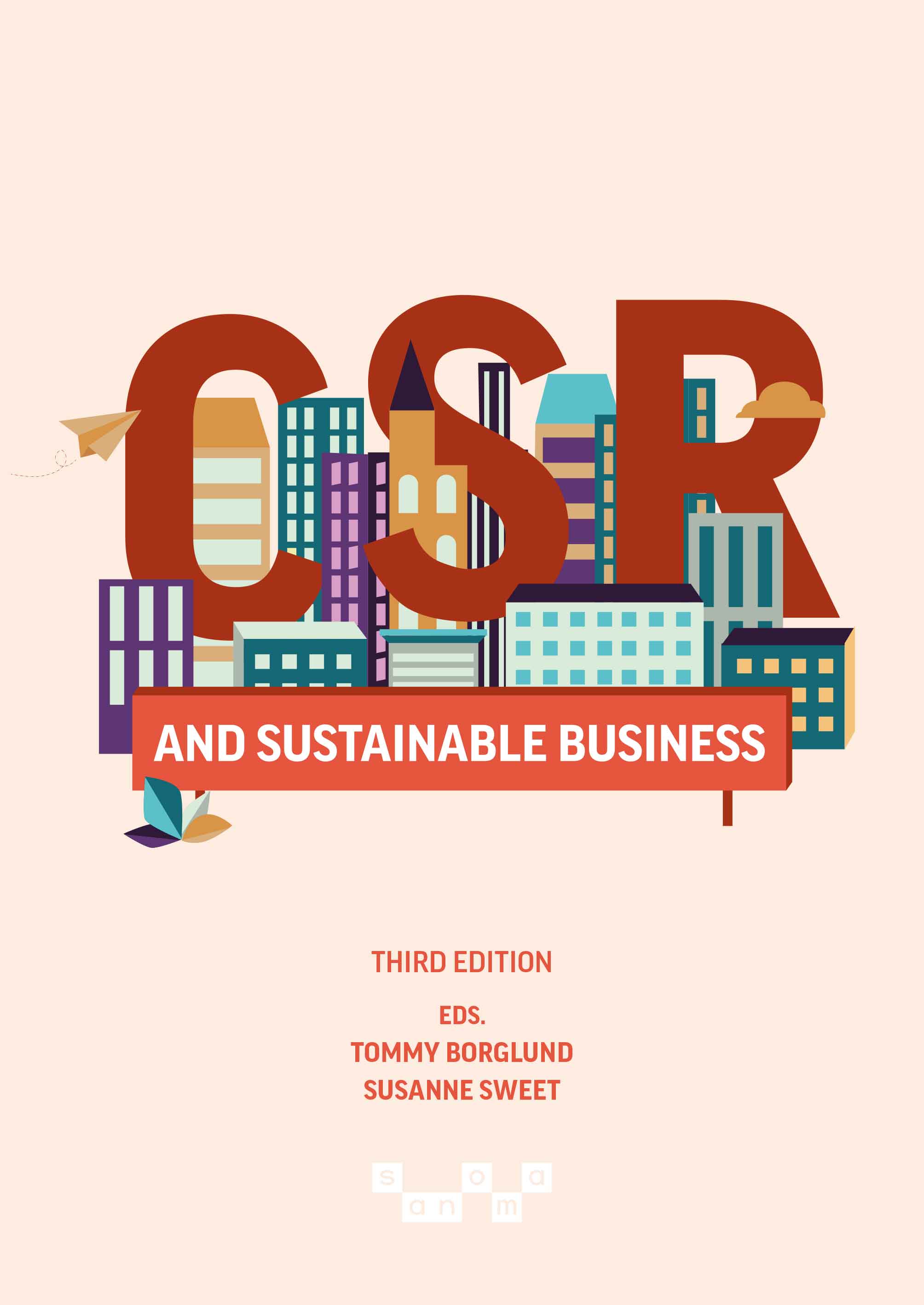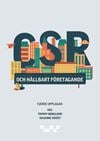Serie
CSR and sustainable business
Upplaga 3
CSR and Sustainable Business explores how sustainability, ethics, and business intersect. This revised edition highlights the impact of geopolitics and new EU regulations in a rapidly changing global landscape.

Författare
Katarina Arbin (author of Chapter 5) got her doctoral degree from the Stockholm School of Economics. She is senior lecturer in Purchasing and Supply Chain Management at the University of Gävle, where she does research and holds lectures on purchasing and sustainability. Katarina is also an affiliated researcher at the Stockholm School of Economics and involved in the research foundation MTC Procurement Research Center. Her research focuses on the role and possibilities of the purchasing function to promote and contribute to sustainable development. Katarina has many years’ experience from the private sector, where she has worked with both purchasing and sustainabil- ity. She is also co-author of the book “Purchasing and Supply Chain Management” together with legendary purchasing researcher Arjan van Weele.
Tommy Borglund (editor and author of Chapters 1, 8, 10, and 11) has a doctoral degree in Business Ethics from the Stockholm School of Economics, where he is also an associated researcher at the Center for Sustainability Research. He is a senior lecturer focused on Sustainabil- ity Business at Örebro University, where he has been responsible for Sweden’s first two-year master’s programme in Sustainable Business. Tommy also established one of the first CSR consultancy groups in Sweden, at the consultancy firm Hallvarsson & Halvarsson, and has been an advisor of many large Sweden companies over the years. Currently, he does this as CEO of Forever Sustainable, a sustainability agency and thinktank operating as a network. Tommy has previously been active as a business journalist, including as head of Ekonomiekot, Sveriges Radio, and managing editor at Finanstidningen.
Magnus Frostenson (author of Chapter 7) is Professor of Industrial Economy and Organisation at Mälardalen University. He also has a background as Professor of Organisation and Leadership at Østfold University College in Norway, and has also been active at several Swed- ish institutes of higher learning, including Örebro University, Uppsala University, and the Stockholm School of Economics. Magnus got his doctoral degree in 2006 at the Stockholm School of Economics with a thesis on ethics and culture in internationalised Swedish companies. Since then, he has published a large number of books, research articles, reports, and book chapters. The main focus of his research is ethics, CSR, sustainability reporting, and organisational control.
Maria Grafström (author of Chapter 2) is Associate Professor of Busi- ness Studies at the Stockholm Centre for Organizational Research (Score) within the Stockholm School of Economics and Stockholm University. Her research centres on the media’s importance for organ- isations and their operations, with a particular focus on dissemination of ideas and the media’s role in setting the agenda regarding ideas about societal responsibilities and sustainability.
Lin Lerpold (author of Chapter 4) is Associate Professor at the Stock- holm School of Economics and head of the Center for Sustainability Research (SIR CSR). Lin is also vicechair of the Sustainable Finance Lab and in charge of the Sustainability Track in the Stockholm School of Economics’ Master’s programme. She founded the Mistra Center for Sustainable Markets (Misum) and has been programme manager for SSE MBA and a visiting researcher at the London School of Eco- nomics and Political Science and at INSEAD. Lin’s research is in the field of social sustainability, focusing on human rights in a broad sense. She is a lecturer in CSR and sustainability at the bachelor’s, master’s, and advanced levels and is involved in public debates on business and sustainability. Every year since 2016, Lin has been nominated for or included on the Sustainable Leaders list created by Aktuell Hållbarhet and in both 2017 and 2018 she was on Veckans Affärer’s list of most powerful women in the category Societal transformers. Lin won the SSE Corporate Partner Pedagogical Award in 2023.
Laurence Romani (author of Chapter 4) is Professor at the Stockholm School of Economics. A central question in her work has been under- standing how organisations approach and manage cultural diversity. She has developed the research area critical cross-cultural management and is currently focused on diversity efforts. Laurence is inspired by sociological theory and her latest study examines how discrimination of people perceived as belonging to an ethnic minority takes place in organisations, despite those organisation’s best intentions not to discriminate. Laurence collaborates with organisations, asking the question: Why do diversity programmes still lead to a form of discrim- ination? Or, to understand underemployment among highly educated migrants: How do companies create the premises for evaluation of people with a migrant background? Laurence’s work is in the field of critical management studies.
Emma Sjöström (author of Chapter 9) has many years’ experience as a researcher in Sustainable Finance at the Mistra Center for Sustainable Markets (Misum) at the Stockholm School of Economics. Emma got her doctoral degree in 2009 in the field of responsible and sustainable investments and her research has mainly focused on what impact in- vestors can have on a company’s sustainability work, directly or indi- rectly, through owner control. In 2022, she received the Hans Dahlborg Foundation’s award for excellent research. Since 2025, Emma Sjöström has been working with sustainability matters at AP7.
Susanne Sweet (editor and author of Chapters 1, 3, 5, and 6) is Associ- ate Professor and Research Director at the Center for Sustainability Research, CSR, at the Stockholm School of Economics. She was a co- founder of the Mistra Center for Sustainability Markets and prior to that led the Sustainability Research Group, SuRe, which received the Globe Award for best CSR research in 2007. Her research and educa- tional efforts focus on corporate social responsibility and sustainability efforts and in 2011–2019 she was the research director for an interdisci- plinary programme on sustainable and circular fashion. In 2020, this programme was lauded by the Royal Swedish Academy of Engineering Sciences (IVA) for “cutting-edge research with the potential to create societal good”. She has written many international articles and books on the topic, including the book “Sustainable Consumption and Pro- duction”, published in two volumes in 2021 (Palgrave Macmillan).
Karolina Windell (author of Chapter 2) is Associate Professor of Busi- ness Studies and has formerly been active at Score, within Stockholm University and the Stockholm School of Economics. She has many years’ experience of research in sustainable business and CSR. Her research has come to focus on the medialisation of business and the media’s role in building and shaping demands on corporate accountability. Karolina has published books and articles in international journals on the topic.
Produkter i serien
-
CSR and sustainable business, upplaga 3
502 kr
Relaterat läromedel
CSR och hållbart företagande
Upplaga 4
Den nya upplagan av CSR och hållbart företagande är uppdaterad för att följa med i den snabba utvecklingen…
Vårt nyhetsbrev
I vårt nyhetsbrev får du tips, erbjudanden och nyheter utifrån dina intresseområden direkt i din mejlkorg.







